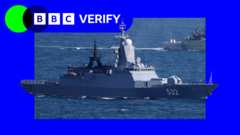The use of Russia's shadow fleet, originally designed to bypass Western sanctions on oil, is now suspected of engaging in sabotage activities. The Finnish Coast Guard reported a ship linked to this fleet, the Eagle S, may have damaged vital underwater cables, escalating tensions with NATO.
Shadow Fleet's New Threat: Russian Oil Tankers Suspected of Sabotage

Shadow Fleet's New Threat: Russian Oil Tankers Suspected of Sabotage
Recent incidents involving Russia’s shadow fleet raise alarm as vessels allegedly conduct sabotage on critical European infrastructure.
In recent developments concerning the Russia-Ukraine war, there is growing apprehension surrounding Moscow's shadow fleet, a group of aging oil tankers tasked with discreetly transporting Russian crude oil worldwide. Initially established to evade Western sanctions post-Ukraine invasion, these vessels now pose an even graver risk: potential sabotage of crucial infrastructure in Europe.
Finnish commandos made headlines recently by boarding the oil tanker Eagle S, which is suspected of severing important underwater cables in the Baltic Sea that connect Finland and Estonia. This vessel reportedly left a Russian port just before the cables’ integrity was compromised, raising serious questions about its operations. If verified, this incident could mark the first documented case of a shadow fleet vessel intentionally engaging in sabotage—a significant escalation in Russia's asymmetric warfare strategy against the West.
Estonia's interior minister, Lauri Läänemets, emphasized the urgency of addressing the risks posed by Russia's hybrid warfare tactics, stating, “We know about Russia’s shadow fleet operating in our area… It’s time to drop the illusions and face it.”
This apprehension led to swift regional responses, with several countries announcing the deployment of additional naval and coast guard forces to secure their waters. NATO’s Secretary-General, Mark Rutte, confirmed the alliance's commitment to bolstering its military presence in the Baltic Sea, responding to requests from both Finland and Estonia, which are part of the NATO alliance.
As the situation evolves, the implications of the shadow fleet's activities could pave the way for heightened tension, drawing the attention of not only military officials but also policymakers across Europe and beyond.























